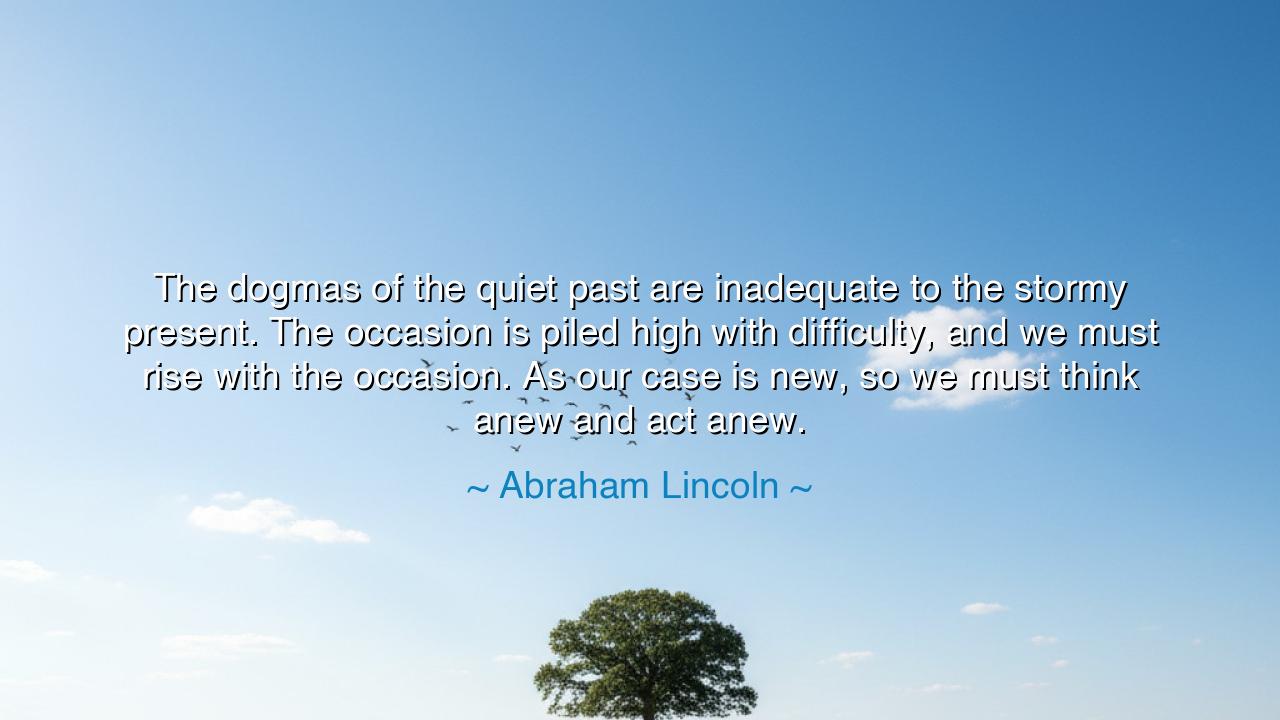
The dogmas of the quiet past are inadequate to the stormy
The dogmas of the quiet past are inadequate to the stormy present. The occasion is piled high with difficulty, and we must rise with the occasion. As our case is new, so we must think anew and act anew.






In the immortal and thunderous words of Abraham Lincoln, the great emancipator and guardian of a nation divided, we hear both warning and awakening: “The dogmas of the quiet past are inadequate to the stormy present. The occasion is piled high with difficulty, and we must rise with the occasion. As our case is new, so we must think anew and act anew.” These words, spoken amid the fires of civil war, are not mere rhetoric—they are a summons to the human spirit. Lincoln calls upon us to abandon complacency, to cast off the comfort of old certainties, and to rise, as a people and as individuals, to meet the demands of a changing age with courage, creativity, and conscience.
The origin of this quote lies in Lincoln’s Annual Message to Congress in December 1862, a time when the United States stood upon the precipice of destruction. The Civil War had torn the land apart; brother fought brother, and the dream of union hung by a thread. The question of slavery, the moral wound that had festered since the nation’s birth, now threatened to destroy the very fabric of the Republic. It was in this crucible of blood and doubt that Lincoln spoke these words—a reminder that the ways of the past, the politics of compromise, and the comfort of custom could no longer guide a nation facing a new and terrible test. The quiet past, he declared, was gone; the stormy present demanded something greater than tradition—it demanded transformation.
To say that “the dogmas of the quiet past are inadequate to the stormy present” is to proclaim a universal truth about the nature of change. Every generation faces moments when the old ways fail, when the familiar paths lead only into darkness. In such times, the wisdom of the ancestors, though honored, must yield to the needs of the hour. Lincoln’s insight was not rebellion against history—it was an act of fidelity to progress. He understood that to cling blindly to old dogmas is to invite ruin. When the world changes, the mind must change with it. Dogma is static, but life is ever-moving, and those who refuse to evolve become prisoners of the past.
Consider the courage it took for Lincoln himself to think anew and act anew. For decades, leaders before him had evaded the question of slavery, content to preserve peace through compromise. But compromise with evil only postpones the reckoning. When the storm came, it fell upon Lincoln to steer the ship of state through chaos. The Emancipation Proclamation, which he would soon issue, was not an act of comfort but of necessity—a recognition that the Union could no longer be preserved without justice. In breaking the old dogmas, Lincoln did not destroy the nation; he renewed it. His vision gave birth to a new America, purified by struggle and rededicated to the promise that all men are created equal.
Throughout history, there have been other moments when humanity was called to rise above the weight of habit. When Galileo looked to the heavens and declared that the earth moved around the sun, he shattered centuries of belief, enduring persecution to uphold truth. When Mahatma Gandhi rejected the old dogmas of violence and empire, he showed the world a new path of resistance rooted in peace. When women around the world demanded their voice and place in society, they too embodied Lincoln’s call—to think anew, to act anew. The storms of history never cease, and in each, the soul of humanity is tested: will we cling to what was, or dare to create what must be?
Lincoln’s words also remind us that difficulty is not a curse but a calling. “The occasion is piled high with difficulty,” he said—not as lament, but as a challenge. For in difficulty lies the opportunity for greatness. The storms of our own time—of division, injustice, and uncertainty—are not unlike those of Lincoln’s day. The answers that once sufficed will no longer do. We, too, must think anew. We must reimagine leadership as service, progress as compassion, freedom as shared responsibility. The storm does not come to destroy the ship, but to test the strength of its sailors.
So, my children, learn from the wisdom of Lincoln: never let the past become your prison. Honor the traditions that carry truth, but do not worship them when they no longer serve justice. When the world trembles and the winds of change howl, do not shrink back into fear. Rise with the occasion. Let your mind be open, your heart steadfast, and your actions bold. For every age has its storm, and every soul is called to rise above it.
Remember this always: the greatness of a people is not in their comfort, but in their capacity for renewal. When the world grows dark and uncertain, it is not dogma that lights the way, but courage—the courage to think anew and act anew, as Lincoln urged. In that courage lies the hope of every generation, and the promise that, though the past may falter, the future remains forever ours to shape.






AAdministratorAdministrator
Welcome, honored guests. Please leave a comment, we will respond soon